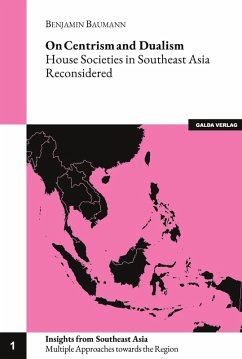This book provides an overview of the anthropological debate on house societies, pertaining particularly to Southeast Asian social formations. The book's point of departure is a comparative model of social formations in Southeast Asia outlined by Shelly Errington. Although this model features prominently in anthropological discussions of the region, no detailed analysis of this comparative approach exists. This might be attributed to the fact that Errington's model is theoretically dense, alluding to the rather complicated anthropological field of kinship studies. Errington's model combines premises of Lévi-Strauss' Structural Anthropology with Clifford Geertz' symbolic or interpretative paradigm and situates the synthesis in the anthropology of insular Southeast Asia. This book traces the genealogy of this model and provides detailed explications of its basic theoretical premises before it explores the concept of house societies and how it is applied by Errington to approach and compare Southeast Asian social formations. The book reveals the structuralism that speaks through Errington's comparative approach by discussing the concept of transformation and indicates the potentials and limitations a typology of different house societies has for the anthropology of Southeast Asia. ABOUT THE SERIES Developments in the field of area studies - goaded by the analytical deconstruction of world regions from their geopolitical sense - have deeply affected the knowledge production from societies and cultures located in the politicized compartmentalization of the globe. With this series, the editors and authors wish to contribute to a reformulation of sensibilities in area studies which emphasizes the epistemic value of contextualized knowledge production. Starting with the notion of Southeast Asia, books published in this series will contribute to a more nuanced understanding of regionality based on a multidisciplinary approach. The series represents an outlet for young scholars intending to publish their degree theses; and for established scholars who are looking for a place to republish out-of-print books. We also encourage scholarly collectives from the regions to publish collaborative works or edited volumes on topics that usually will not attract the attention of big presses due to their transdisciplinary orientation. EDITORIAL BOARD Prof. Vincent Houben Prof. Boike Rehbein Prof. Barend Terwiel Dr. Benjamin Baumann Dr. Daniel Bultmann
Dieser Download kann aus rechtlichen Gründen nur mit Rechnungsadresse in A, B, BG, CY, CZ, D, DK, EW, E, FIN, F, GR, HR, H, IRL, I, LT, L, LR, M, NL, PL, P, R, S, SLO, SK ausgeliefert werden.


